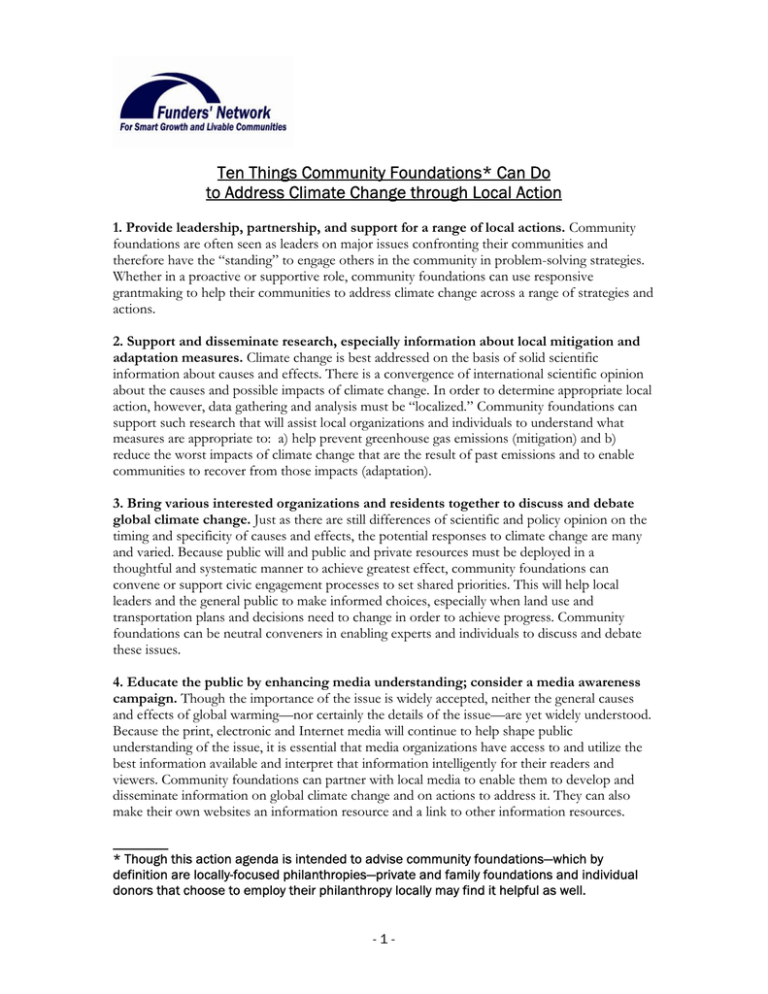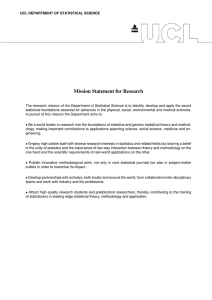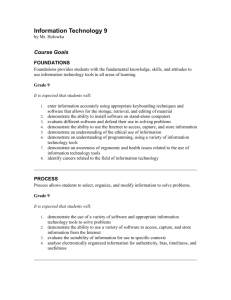Ten Things Community Foundations* Can Do
advertisement

Ten Things Community Foundations* Can Do to Address Climate Change through Local Action 1. Provide leadership, partnership, and support for a range of local actions. Community foundations are often seen as leaders on major issues confronting their communities and therefore have the “standing” to engage others in the community in problem-solving strategies. Whether in a proactive or supportive role, community foundations can use responsive grantmaking to help their communities to address climate change across a range of strategies and actions. 2. Support and disseminate research, especially information about local mitigation and adaptation measures. Climate change is best addressed on the basis of solid scientific information about causes and effects. There is a convergence of international scientific opinion about the causes and possible impacts of climate change. In order to determine appropriate local action, however, data gathering and analysis must be “localized.” Community foundations can support such research that will assist local organizations and individuals to understand what measures are appropriate to: a) help prevent greenhouse gas emissions (mitigation) and b) reduce the worst impacts of climate change that are the result of past emissions and to enable communities to recover from those impacts (adaptation). 3. Bring various interested organizations and residents together to discuss and debate global climate change. Just as there are still differences of scientific and policy opinion on the timing and specificity of causes and effects, the potential responses to climate change are many and varied. Because public will and public and private resources must be deployed in a thoughtful and systematic manner to achieve greatest effect, community foundations can convene or support civic engagement processes to set shared priorities. This will help local leaders and the general public to make informed choices, especially when land use and transportation plans and decisions need to change in order to achieve progress. Community foundations can be neutral conveners in enabling experts and individuals to discuss and debate these issues. 4. Educate the public by enhancing media understanding; consider a media awareness campaign. Though the importance of the issue is widely accepted, neither the general causes and effects of global warming—nor certainly the details of the issue—are yet widely understood. Because the print, electronic and Internet media will continue to help shape public understanding of the issue, it is essential that media organizations have access to and utilize the best information available and interpret that information intelligently for their readers and viewers. Community foundations can partner with local media to enable them to develop and disseminate information on global climate change and on actions to address it. They can also make their own websites an information resource and a link to other information resources. ________ * Though this action agenda is intended to advise community foundations—which by definition are locally-focused philanthropies—private and family foundations and individual donors that choose to employ their philanthropy locally may find it helpful as well. -1- 5. Use investment assets to leverage funds available for local action. Local actions hold significant promise for new job creation in fields such as green chemistry, materials recycling, retrofitting buildings, and many more. But access to capital to jump start these efforts can sometimes be difficult. Foundations can make program-related investments, offer loan guarantees, contribute to revolving loan pools, and take other steps to leverage their endowments to support implementation efforts across many sectors. 6. Support nonprofit organizations that will lead in addressing climate change; assist other nonprofits to see how they can help. The natural “constituency” for community foundations is found in the nonprofit sector. Community foundations can support them— regardless of their individual missions and activities—to discover and deploy their own actions to address climate change. 7. Partner with local governments to address climate change through local action. Many local government leaders have taken important leadership roles in calling for climate change action, and have directed various agencies and departments of local government to become involved. Community foundations can partner with or support local governments to develop climate plans for their communities and to assess their effectiveness over time. One often useful yet inexpensive strategy is to support public employees to participate in peer-to-peer exchanges to learn from staff in governments that are further along in their efforts. 8. Develop and support positive local economic strategies. It is well understood that there will be national and international economic implications in the effort to address global climate change. Market and “price signals” will change—for businesses as well as individuals—and new industries, businesses, jobs, and career ladders will develop. The local economic impacts and opportunities presented by climate change and by climate actions are not as well understood, and community foundations can assist in developing this understanding. Apart from the “macroeconomic” consequences of climate change and climate action, community foundations that focus especially on low-income communities and individuals can help develop strategies and programs that will assist them to avoid or ameliorate negative economic impacts and to develop and implement positive economic opportunities. 9. Engage in policy discussions to help guide state and national policy on global climate change. Though not all community foundations support policy-related activities—nor support local “buy-in” for state or national level policy-related activities—for those that are able to do so, the climate action field is ripe with possibility. This is especially true for state governments that are leading the way through bold and sophisticated responses to global warming. Because the causes and consequences of global warming are ubiquitous, the sustained interest and action of government at all levels is necessary to solve the climate change challenge. 10. Advise donors, and recruit new donors, to contribute to climate action solutions. Rarely in history has an issue caught the attention of people across all income, geographic, and philosophical outlooks as has global climate change. Community foundations are uniquely positioned to enable their donors, or potential donors, to understand how they can contribute to solving one of the most serious problems facing this and future generations. Please join us in this vital work. For further information, please e-mail: Ben Starrett (ben@fundersnetwork.org), Executive Director; or Nick Bollman (nick@fundersnetwork.org), Senior Fellow. You may also call us at (305) 667-6350 ext. 206. -2-


